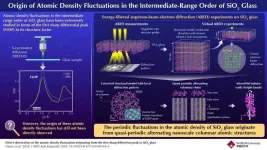(Press-News.org) Black patients with early-stage breast cancer who were treated with docetaxel chemotherapy every 3 weeks had less drug-induced peripheral neuropathy and significantly fewer dose reductions compared to those who received weekly paclitaxel, according to a trial by the ECOG-ACRIN Cancer Research Group (ECOG-ACRIN). Study EAZ171 is the first National Cancer Institute (NCI)-sponsored trial to focus specifically on enrolling a minority or underserved population to assess drug-induced toxicity (rather than drug efficacy) where there are known disparate outcomes.
Results were presented today at the 2024 Annual Meeting of the American Society of Clinical Oncology (ASCO) in Chicago and published in the Journal of Clinical Oncology.
"To date, clinical trials in the US have suffered from a disproportionate lack of Black patients. Lack of representation is problematic, given significant disparities in cancer outcomes by race. Here, we sought to not just describe disparities but to begin to understand and address them to improve equity in breast cancer care," said presenter Tarah J. Ballinger, MD, medical director of breast cancer prevention at Indiana University Melvin and Bren Simon Comprehensive Cancer Center, Vera Bradley Foundation Scholar in Breast Cancer Research, and Associate Professor at Indiana University School of Medicine.
Despite Black patients having a 4% lower incidence of breast cancer than white patients across the United States, they have a 40% higher death rate from breast cancer (American Cancer Society). The difference in the death rate is not explained by Black patients having more aggressive cancers.
Previous research has found that Black people or those of genetically determined African ancestry with breast cancer experience significantly more peripheral neuropathy compared to people of other ancestries. Peripheral neuropathy is painful nerve damage that usually starts in the hands and feet and gets worse over time. Specific genetic differences could be a factor. Higher rates of neuropathy are associated with dose reductions of chemotherapy and lower cure rates.
Study EAZ171 was designed to validate genetic predictors of taxane-induced peripheral neuropathy (TIPN) and to determine the optimal taxane-based chemotherapy to lessen TIPN for Black patients with early-stage breast cancer. The trial enrolled 249 participants, all of whom received a guideline-recommended taxane-based chemotherapy treatment as recommended by their physician: docetaxel every 3 weeks (n=123) or weekly paclitaxel (n=126).
Researchers observed elevated rates of moderate or severe TIPN with paclitaxel versus docetaxel as recorded by physicians (44% vs. 25%) and reported by patients (40% vs. 24%). Participants on paclitaxel experienced significantly more TIPN-related dose reductions than those on docetaxel (28.1% vs. 8.5%). All-cause dose reduction rates were 38.8% for paclitaxel vs. 24.6% for docetaxel.
"This study confirmed that Black patients with breast cancer have a very high risk of drug-induced peripheral neuropathy," said Dr. Ballinger. "Further, we found that one taxane—docetaxel—was associated with significantly less neuropathy and dose reduction of chemotherapy than paclitaxel, suggesting this drug may be a better choice for many Black patients."
Although Black patients or those of genetically determined African ancestry are at higher risk for TIPN as a group, there is variation across individuals. Therefore, the trial's primary endpoint was to evaluate inherited germline predictors of TIPN found in DNA. The trial did not meet its primary endpoint. Nearly three-fourths of the women in each treatment arm were classified as high risk for TIPN based on genetic alterations. Yet there were no differences in the occurrence of neuropathy in high- versus low-risk women, regardless of which taxane they received.
“We studied two specific genes - SBF2 and FCAMR. It is likely that these genes do matter, but that TIPN is multigenic and multifactorial, so these genes alone are not enough to predict risk of TIPIN. We have more work to do to understand and predict TIPN in this population,” said Dr. Ballinger.
For the next steps, ECOG-ACRIN researchers are planning another trial to determine how further to optimize taxane therapy for Black patients with breast cancer. They will also build on the current study's unique and successful approach to enrollment for future oncology trials.
"While the trial focused specifically on Black people, the results highlight the need to personalize therapy to minimize toxicity," said Dr. Ballinger. "Importantly, this study offers a blueprint for how to design and recruit for a study focusing on a minority or underserved patient population."
The study was designed and implemented in collaboration with Black cancer patient advocacy groups. For instance, Pink-4-Ever Ending Disparities, an Indiana non-profit launched to help close inequities in breast cancer care for Black women, assisted with trial recruitment via social media, such as YouTube. Further, many enrolled patients came from sites in the NCI Community Oncology Research Program (NCORP) rather than solely from academic settings. Not only did investigators overcome challenges in recruiting a heavily under-represented population, but they did so during the COVID-19 pandemic and in a relatively short time.
“Tailoring research to the needs of underserved populations is effective. This trial succeeded because of the partnership with Black patients,” said Dr. Ballinger.
Study EAZ171 was funded by the NCI Division of Cancer Prevention. NCI is part of the US National Institutes of Health. Additional support was provided by the Susan G. Komen® organization and the Vera Bradley Foundation for Breast Cancer.
About ECOG-ACRIN
The ECOG-ACRIN Cancer Research Group (ECOG-ACRIN) is an expansive membership-based scientific organization that designs and conducts cancer research involving adults who have or are at risk of developing cancer. The Group comprises nearly 1400 member institutions and 21,000 research professionals in the United States and around the world. ECOG-ACRIN is known for advancing precision medicine and biomarker research through its leadership of major national clinical trials integrating cutting-edge genomic approaches. Member researchers and advocates collaborate across more than 40 scientific committees to design studies spanning the cancer care spectrum, from early detection to management of advanced disease. ECOG-ACRIN is funded primarily by the National Cancer Institute, part of the National Institutes of Health. Follow us on Twitter/ X @eaonc, Facebook, LinkedIn, Instagram, and YouTube, or call 202-744-4343.
END
ECOG-ACRIN completes first trial of Black patients with early-stage breast cancer
This consequential trial sought to do more than just describe outcome disparities; it aimed to begin to address them to improve equity in breast cancer care. Its results demonstrate that tailoring research to the needs of underserved groups is effective
2024-06-03
ELSE PRESS RELEASES FROM THIS DATE:
Understanding the atomic density fluctuations in silica glass
2024-06-03
In materials science, particularly in the study of glasses, the intermediate range order (IRO) is one of the most intriguing research areas owing to its significant influence over the physical properties of glasses. The IRO refers to the structural arrangement of atoms beyond the short-range order (atomic arrangement within a few atomic distances) but shorter than the long-range order (arrangement patterns over macroscopic distances). Notably, for covalent glasses, the IRO is marked by atomic density fluctuations.
Scattering experiments provide a distinct signature of ...
Crucial shift in River Nile’s evolution during ancient Egypt discovered
2024-06-03
Crucial shift in River Nile’s evolution during ancient Egypt discovered
Researchers have explored how the River Nile evolved over the past 11,500 years and how changes in its geography could have helped shape the fortunes of ancient Egyptian civilisation.
Research published in Nature Geoscience reveals a major shift in the Nile around four thousand years ago, after which the floodplain in the Nile Valley around Luxor greatly expanded.
The findings raise the possibility that this shift could have contributed to the success of the ancient Egyptian agricultural economy at points between the Old and New Kingdom periods. ...
Study shows college students have less empathy when they are less alert
2024-06-03
DARIEN, IL – A new study to be presented at the SLEEP 2024 annual meeting found robust evidence that implicates lower alertness, a key outcome of insufficient sleep, as a predictor of muted empathic responding, which suggests alertness may support both cognitive and affective empathy.
Results show that slower response times on objective alertness tests were significantly associated with lower levels of empathic concern, and that lapses and false starts on these tests were significantly associated with poorer empathic accuracy. Additionally, those ...
Study finds that older adults with sleep apnea have higher odds of hospitalization
2024-06-03
DARIEN, IL – A new study to be presented at the SLEEP 2024 annual meeting found that sleep apnea is associated with increased odds of future utilization of health care services including hospitalization among older adults.
Results show that participants aged 50 years and older with sleep apnea had a 21% higher odds of reporting future use of any health service compared with those without sleep apnea. Specifically, individuals with sleep apnea had 21% higher odds of hospitalization after controlling for potential confounders including demographics, body mass index, health conditions, and depressive symptoms.
“Our research indicates that older adults who have sleep apnea are more ...
Most sleep tips shared on TikTok are supported by scientific evidence
2024-06-03
DARIEN, IL – A new study to be presented at the SLEEP 2024 annual meeting found that most sleep tips shared on TikTok are supported by empirical evidence.
The research findings show that of 35 unique sleep tips shared in popular videos, there was empirical support for 29. Only six sleep tips were unsupported by scientific evidence.
“These results suggest that the sleep research and sleep medicine communities have done a good job of promoting appropriate tips for sleep hygiene,” said lead author Brian T. Gillis, who has studied sleep for eight years and is an assistant professor of marriage and family therapy in the College of Human Sciences ...
Low-dose aspirin reduces inflammation caused by sleep loss
2024-06-03
DARIEN, IL – A new study to be presented at the SLEEP 2024 annual meeting found that low-dose acetylsalicylic acid, also known as aspirin, can reduce inflammatory responses to sleep restriction.
Results show that compared with placebo, preemptive administration of low-dose aspirin during sleep restriction reduced pro-inflammatory responses. Specifically, aspirin reduced interleukin-6 expression and COX-1/COX-2 double positive cells in lipopolysaccharide-stimulated monocytes, as well as C-reactive protein serum levels.
“The novelty of this study is that it investigated whether we can pharmacologically reduce the inflammatory consequences of sleep restriction,” ...
Scientists develop “x-ray vision” technique to see inside crystals
2024-06-03
A team of New York University researchers has created a new way to visualize crystals by peering inside their structures, akin to having X-ray vision. Their new technique—which they aptly named “Crystal Clear”—combines the use of transparent particles and microscopes with lasers that allow scientists to see each unit that makes up the crystal and to create dynamic three-dimensional models.
“This is a powerful platform for studying crystals,” says Stefano Sacanna, professor of chemistry at NYU and the principal investigator for the study, published in the journal Nature ...
Arctic melting heavily influenced by little-studied meteorological phenomena, find scientists led by UMass Amherst
2024-06-03
AMHERST, Mass. – A team of scientists led by François Lapointe, a research associate at the University of Massachusetts Amherst, has combined paleoclimatic data from the last 2,000 years with powerful computer modeling and in-the-field research on lake sediments and tree rings to show that an understudied phenomenon, known as atmospheric blocking, has long influenced temperature swings in the Arctic. As temperatures warm due to climate change, atmospheric blocking will help drive ever-wilder weather events. The study focused ...
Where do Nextdoor communities exist—and what do these communities talk about?
2024-06-03
Nextdoor is the world’s largest hyperlocal social media network, used by 13% of American adults. Yet little is known about the make-up of the actual neighborhoods—numbering approximately 220,000 across the United States—in which these accounts exist and what people in those communities talk about on the platform.
To address our limited understanding of this population, a team of New York University and University of Michigan researchers generated a demographic portrait of communities in which Nextdoor neighborhoods exist, the presence of public agencies in those communities, and what topics are most often discussed. Using U.S. Census data, other publicly available ...
Thawing permafrost: Not a climate tipping element, but nevertheless far-reaching impacts
2024-06-03
Permafrost soils store large quantities of organic carbon and are often portrayed as a critical tipping element in the Earth system, which, once global warming has reached a certain level, suddenly and globally collapses. Yet this image of a ticking timebomb, one that remains relatively quiet until, at a certain level of warming, it goes off, is a controversial one among the research community. Based on the scientific data currently available, the image is deceptive, as an international team led by the Alfred Wegener Institute has shown in a recently released study. According to their findings, there is no single ...
LAST 30 PRESS RELEASES:
New knowledge on heritability paves the way for better treatment of people with chronic inflammatory bowel disease
Under the Lens: Microbiologists Nicola Holden and Gil Domingue weigh in on the raw milk debate
Science reveals why you can’t resist a snack – even when you’re full
Kidney cancer study finds belzutifan plus pembrolizumab post-surgery helps patients at high risk for relapse stay cancer-free longer
Alkali cation effects in electrochemical carbon dioxide reduction
Test platforms for charging wireless cars now fit on a bench
$3 million NIH grant funds national study of Medicare Advantage’s benefit expansion into social supports
Amplified Sciences achieves CAP accreditation for cutting-edge diagnostic lab
Fred Hutch announces 12 recipients of the annual Harold M. Weintraub Graduate Student Award
Native forest litter helps rebuild soil life in post-mining landscapes
Mountain soils in arid regions may emit more greenhouse gas as climate shifts, new study finds
Pairing biochar with other soil amendments could unlock stronger gains in soil health
Why do we get a skip in our step when we’re happy? Thank dopamine
UC Irvine scientists uncover cellular mechanism behind muscle repair
Platform to map living brain noninvasively takes next big step
Stress-testing the Cascadia Subduction Zone reveals variability that could impact how earthquakes spread
We may be underestimating the true carbon cost of northern wildfires
Blood test predicts which bladder cancer patients may safely skip surgery
Kennesaw State's Vijay Anand honored as National Academy of Inventors Senior Member
Recovery from whaling reveals the role of age in Humpback reproduction
Can the canny tick help prevent disease like MS and cancer?
Newcomer children show lower rates of emergency department use for non‑urgent conditions, study finds
Cognitive and neuropsychiatric function in former American football players
From trash to climate tech: rubber gloves find new life as carbon capturers materials
A step towards needed treatments for hantaviruses in new molecular map
Boys are more motivated, while girls are more compassionate?
Study identifies opposing roles for IL6 and IL6R in long-term mortality
AI accurately spots medical disorder from privacy-conscious hand images
Transient Pauli blocking for broadband ultrafast optical switching
Political polarization can spur CO2 emissions, stymie climate action
[Press-News.org] ECOG-ACRIN completes first trial of Black patients with early-stage breast cancerThis consequential trial sought to do more than just describe outcome disparities; it aimed to begin to address them to improve equity in breast cancer care. Its results demonstrate that tailoring research to the needs of underserved groups is effective




